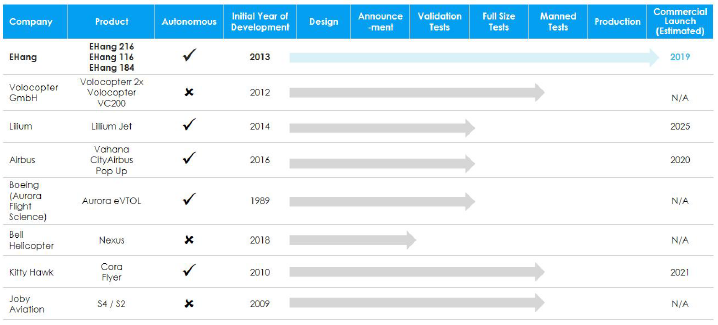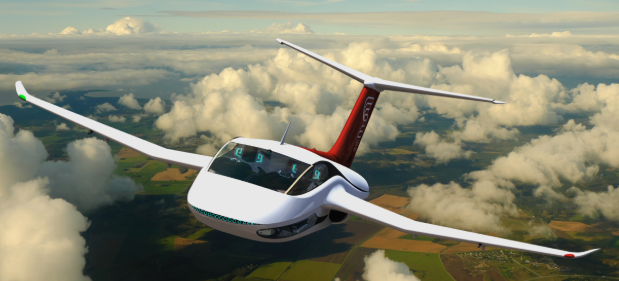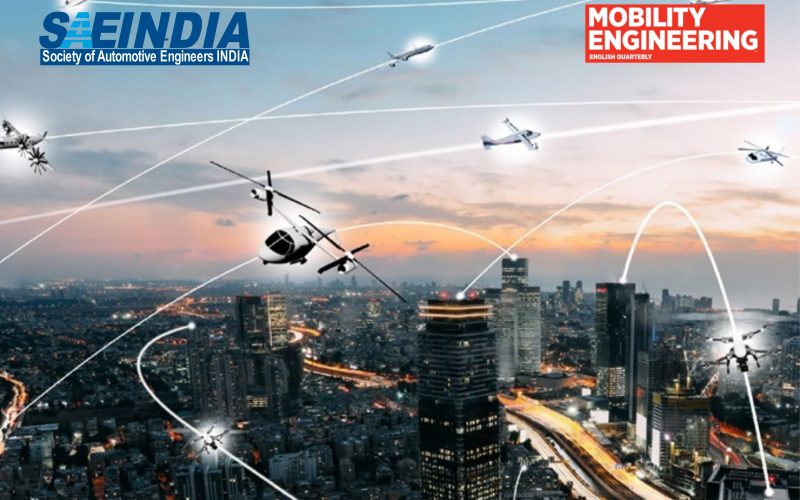UDAN and Urban Air Mobility – Challenges and Opportunities in India
Traffic congestion worldwide is a recurring/ubiquitous phenomenon that reduces productivity, increases pollution from stranded or slow-moving vehicles, and impacts the health of travellers through increased stress levels. Additionally, due to inadequacies in ground transportation infrastructure in many densely populated cities around the world, especially in emerging markets like India, alternate modes of transport for better connectivity are of paramount need with the inherent conditions that they are widespread and affordable. In this context, short-haul air transport finds a place with two important segments; one that focuses on Urban Air Mobility (UAM) primarily in large metropolitan cities using electrified Vertical Take Off and Landing (eVTOL) vehicles and the second that focuses more on inter-city commute by operationalizing underused/unused airports using fixed wing aircraft.
UDAN-RCS Scheme of Government of India
In June 2016, the Ministry of Civil Aviation (MoCA), Government of India (GOI), released the National Civil Aviation Policy 2016 (NCAP 2016) including UDAN-RCS, where UDAN (Ude Desh ka Aam Naagrik) is a regional airport development program with Regional Connectivity Scheme (RCS) to enhance regional air connectivity across the country through fiscal support and infrastructure development. The primary objective of UDAN scheme is to operationalize approximately 425 unserved and underserved regional airports with regular scheduled and give the common citizen an opportunity to fly through affordable and widespread air travel (Ref [1], [2]). The UDAN scheme had two components, with the first component to develop new airports and enhance the existing regional airports and achieve the target of almost doubling the number of operational airports by 2018. The second component had the objective of adding several hundred financially viable, capped-airfare, new regional flight routes to connect more than 100 underserved and unserved airports in smaller towns with each other and also to improve connectivity with larger cities/airports nearby through the creation of “Viability Gap Funding (VGF)” with contributions from both GOI and State Governments (Ref[2]). MoCA subsequently included air routes along India’s vast coastline to connect them through amphibian seaplanes and helicopters with successful launches from Statue of Unity in Kevadia to Sabarmati in Gujarat and from Kollam to Kochi in Kerala. In August 2020, MoCA approved 78 additional routes to be awarded under the 4th round of UDAN-RCS with focus on boosting connectivity in the North East, hilly states, and islands (Ref [3]).
Urban Air Mobility (UAM)
The increasing urbanization in many cities across the world has increased traffic congestion and pollution levels, leading to many hours of lost productivity and impact on the health of the residents, ultimately affecting the economic growth of the country. Urban Air Mobility (UAM) is a relatively new concept aimed at offering safe and efficient air traffic operations in a metropolitan area for manned and unmanned aircraft systems (Ref [4]). Over the last few years, UAM has evolved into a disruptive transportation mode, ready to offer an alternative to existing ground transportation, especially in areas where infrastructure is found wanting. UAM has been accumulating new use cases to offer alternative air transport in emergency services, eCommerce delivery, mission critical applications such as fire and crowd control, short-haul professional travel (e.g., airport to downtown, city centre to suburbs), and tourism. A list of eVTOL companies is shown in Figure 1 (Ref[4]), where different organizations have matured into different stages of design, development, validation, and serial production.

Fig 1. eVTOL Companies (Ref [4])
Short Haul Travel in India – UDAN vs UAM
In looking at similarities between UDAN and UAM, it is important to note the major components as shown in Figure 2 and listed below: (Ref [4])
- aircraft for UDAN and vehicles (Autonomous Air Vehicles (AAVs), eVTOLs etc.) for UAM
- command-and-control platforms
- navigation and positioning systems
- regulatory, safety, and comfort systems
- base points including infrastructure of landing pads for AAVs and eVTOLs or runways for aircraft, charging ports or fuel refilling stations etc.
- user interface for booking, transportation to the airport or launching pad, and further travel to the destination

Fig 2. UAM Key Components (Ref [4])
Eviation, an electric aircraft start-up from Israel announced that their aircraft “Alice”, with a length of about 13m, wingspan of about 16m, battery capacity of 920 KWH, and drivetrain that can produce 900 KW peak and 260 KW in cruise mode, can accommodate 9 passengers and 2 crew members with 440 nautical miles of range using NMC chemistry for battery cells (Ref [6]). News reports indicate that two different versions of the Alice are planned. While the initial model will use Lithium-ion battery primarily for air-taxi operations, the latter version may be rolled out with a larger, more powerful Aluminium-air battery, in a collaborative effort with Phinergy, another start up from Israel (Ref [7]). As Phinergy has already been working with Indian Oil Corporation Limited (IOCL) on offering Aluminium-air battery technology for automotive vehicles, there is an opportunity for GOI to explore test trials of Alice in India at a future date.

Fig 2. UAM Key Components (Ref [4])
There are quite a few start-ups exploring hybrid electric VTOL aircraft, including Samad Aerospace, VerdeGo Aero, Sabrewing etc. A concept of hybrid electric VTOL (he-VTOL) aircraft from Samad Aerospace is shown in Figure 4 (Ref [8]).

Fig 4. Q-Starling Jet from Samad Aerospace (Ref [8])
The U.S. Navy and Pentagon started hosting a fly-off competition called Unmanned Logistics Support-Air (ULS-A) in Yuma, Arizona to find a UAV resupply vehicle capable of carrying up to 30 kgs though the long term goal is to extend this to UAVs that can carry loads up to 2000 kgs (Ref [9]).
Few options are available for MoCA, GOI, with initial trials on passenger transport or air logistics support; 1) go with existing conventional engine based fixed wing aircraft, 2) try out all electric eVTOL aircraft, 3) explore autonomous hybrid he-VTOL aircraft for logistics, and 4) extend this to ferrying passengers.
Summary and Way Forward
For short haul inter-city travel to succeed in India, UDAN-RCS with fixed wing aircraft may be the best initiative. Though this aims to reduce the inter-city travel time, it does not necessarily address the rising pollution levels as we continue to use conventional fixed wing aircraft.
As a way forward, it would be great if GOI could explore the possibilities of
a) employing electric aircraft (eVTOL) on experimental basis such as Alice aircraft from Eviation, Israel (Ref [6]) or
b) exploring synergies between Phinergy, IOCL, and National Aerospace Laboratories (NAL) on building a concept prototype using Saras aircraft, or
c) collaborating with Samad Aerospace, UK on hybrid electric fixed-wing aircraft (he-VTOL) to try on select routes and take UDAN-RCS to the next level.
In a parallel development, UAM can be explored in large metropolitan cities such as Delhi, Mumbai, Chennai, and Bangalore for intra-city short haul travel to provide an alternative to ever growing traffic snarls and ever-increasing loss of productivity and pollution levels.
References
- “UDAN Scheme, Government of India,” https://en.wikipedia.org/wiki/UDAN#
- “Regional Connectivity Scheme (RCS), Ministry of Civil Aviation, Government of India,” https://www.civilaviation.gov.in/sites/default/files/Final%20Regional%20Connectivity%20Scheme%20%28RCS%29.pdf
- “Government approves 78 new routes under UDAN scheme: focus on North East, islands” https://www.hindustantimes.com/india-news/govt-approves-78-new-routes-under-udan-scheme-focus-on-north-east-islands/story-NDH3asvUJZK3VyeJ5GF7fK.html
- EHang, “The Future of Transportation: White Paper on Urban Air Mobility,” Jan 15, 2020 (https://www.ehang.com/app/en/EHang%20White%20Paper%20on%20Urban%20Air%20Mobility%20Systems.pdf )
- H. Kinjo, “Development Trends and Prospects for eVTOL: A New Mode of Air Mobility,” Mitsui & Co Global Strategic Studies Institute Monthly Report, June 2018 (https://www.mitsui.com/mgssi/en/report/detail/__icsFiles/afieldfile/2019/07/18/1906m_kinjo_e.pdf)
- Eviation Alice, Israel, http://www.eviation.co/
- D. Sigler, “A huge battery with an airplane painted on it,” 24 June 2019, http://sustainableskies.org/huge-battery-airplane-painted/
- Samad Aerospace Q-Starling Jet, https://evtol.com/news/samad-aerospace-q-starling-concept/
- B. Garrett-Glaser, “Pentagon to leverage commercial R&D in hybrid VTOL aircraft for logistics,” https://www.aviationtoday.com/2020/01/28/pentagon-leverage-commercial-rd-hybrid-vtol-aircraft-logistics/
 |
Dr. Arunkumar M. Sampath is a Cluster Head – Electric Vehicles in Tata Consultancy Services (TCS). His interests include Hybrid and Electric Vehicles, Sustainable Technologies, Connected and Autonomous Vehicles, Functional Safety, AI, ML, Data Analytics, and Data Monetization Strategies. |



